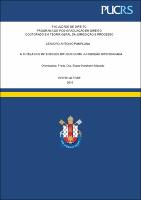| Share record |


|
Please use this identifier to cite or link to this item:
https://tede2.pucrs.br/tede2/handle/tede/6817| Document type: | Tese |
| Title: | A tutela dos interesses difusos como jurisdição diferenciada |
| Author: | Pamplona, Leandro Antonio  |
| Advisor: | Macedo, Elaine Harzheim |
| Abstract (native): | O presente estudo analisa as consequências operadas pelos direitos difusos na Jurisdição. Com a identificação e a tutela de direitos coletivos diversos institutos processuais clássicos, tais como legitimidade, sentença e coisa julgada, desenvolvidos com base em conflitos individuais, tiveram que ser repensados. Não obstante, essa releitura se acentua ainda mais nos direitos difusos. Em virtude das características desses direitos, especialmente pela sua indivisibilidade e pela indeterminação absoluta de seus titulares, vinculando, dessa forma, toda coletividade, resta assente uma forma jurisdicional diferenciada. A necessidade de se pensar numa jurisdição diferenciada para tutelar os direitos difusos se consubstancia em três principias vetores: 1) na natureza distinta desses direitos (direitos que afetam a coletividade como um todo); 2) na inevitabilidade de uma posição diferenciada do julgador nas ações envolvendo esses direitos; e 3) na sua força normativa. Diferentemente dos direitos coletivos stricto sensu e individuais homogêneos, os direitos difusos pertencem à coletividade como um todo, não repercutindo apenas na esfera individual ou de um grupo determinado. Em virtude dessa situação os direitos difusos gozam de uma relevância coletiva. A partir daí justifica-se uma postura mais ativa do julgador e com maior responsabilidade social, cabendo a ele realizar o controle da parte que leva esse direito a juízo, e também aditar ou alterar o pedido ou a causa no processo. Com efeito, as mudanças não ficam restritas ao processo. A ação que busca a promoção de direitos difusos representa uma forma de participação da coletividade nas políticas públicas. O julgador ao promover esses direitos acaba definindo políticas públicas e sua decisão possui uma natureza não apenas jurisdicional, mas também com forte conteúdo administrativo, a sustentar uma jurisdição diferenciada nas ações envolvendo direitos difusos, profundamente comprometida com o bem comum. |
| Abstract (english): | This study analyzes the diffuse rights consequences in the jurisdiction. It is necessary to rebuild logical thoughts with the identification and protection of collective rights several classic procedural institutes such as legitimacy, judgment and res judicata, developed based on individual conflicts. Nevertheless, this rethinking is accentuated further in the diffuse rights. Given the characteristics of these rights, especially for its indivisibility and the absolute indeterminacy of their holders by linking thus the whole community, remains settled a different court order. The need to think of a different jurisdiction to protect the diffuse rights is embodied in three main directions: 1) diffuse rights distinct nature (rights affecting all community); 2) the inevitability of the judge differentiated position of actions involving these rights; and 3) the law strength. Unlike the strict sense collective rights and individual homogeneous, diffuse rights belong to the whole community and reflect not just to individual level or a specific group. Given this situation the diffuse rights appear with collective relevance. From this point it is justified a more active role of the judge and greater social responsibility that allows the necessity to perform the control the part that send this right to justice, and also to supplement or amend the application or issue in the case. Indeed, the changes are not restricted to the process. The action that seeks to promote diffuse rights is the community participation in public policy. The judge promoting these rights, in the end defines public policies and their decision has not just a judicial nature. It has also strong administrative content, to support a different jurisdiction in actions involving diffuse rights, deeply committed to the common good. |
| Keywords: | JURISDIÇÃO TUTELA (DIREITO) DIREITO COLETIVO - BRASIL DIREITO PROCESSUAL CIVIL |
| CNPQ Knowledge Areas: | CIENCIAS SOCIAIS APLICADAS::DIREITO |
| Language: | por |
| Country: | Brasil |
| Publisher: | Pontifícia Universidade Católica do Rio Grande do Sul |
| Institution Acronym: | PUCRS |
| Department: | Faculdade de Direito |
| Program: | Programa de Pós-Graduação em Direito |
| Access type: | Acesso Aberto |
| URI: | http://tede2.pucrs.br/tede2/handle/tede/6817 |
| Issue Date: | 29-Mar-2016 |
| Appears in Collections: | Programa de Pós-Graduação em Direito |
Files in This Item:
| File | Description | Size | Format | |
|---|---|---|---|---|
| TES_LEANDRO_ANTONIO_PAMPLONA_PARCIAL.pdf | Texto Parcial | 1.18 MB | Adobe PDF |  Download/Open Preview |
Items in DSpace are protected by copyright, with all rights reserved, unless otherwise indicated.




